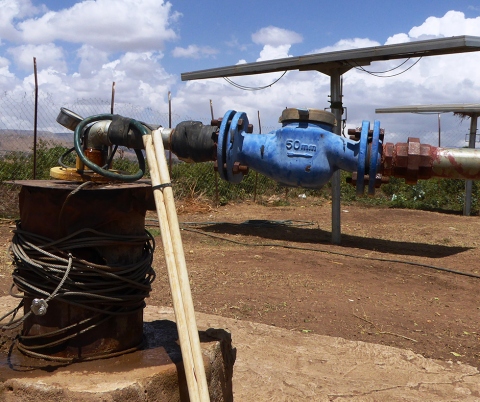Strategies for Energy, Water and Agriculture in Rural Ethiopia (2020-2021)
This project team investigated the economic viability and resource sustainability of mini-grid-powered irrigation in Ethiopia, and to understand key factors that contribute to the viability at a particular site. Team members analyzed 10 pilot sites in Ethiopia to determine if mini-grid powered irrigation generates enough energy demand to make it economically viable. The team also investigated the sustainability of withdrawing water at the projected levels at each site.
Team members split into three subteams:
- The first team improved an existing model of the breakeven cost for mini-grid powered irrigation and carried out a sensitivity analysis to determine which factors are most important to determine the economic viability of a site. They analyzed the relationship between the amount of water input and the crop yield, and incorporated additional site-specific variables into the model. Of the 47 characteristics they looked at, they found that the number of fruit crops, as opposed to vegetable crops, and the average size of the farms were most important to determining a site’s viability. They also found that using drip irrigation, instead of furrow, can improve the attractiveness of sites, especially those with fruit crops.
- The second team focused on mapping the availability of water as a resource across the country. Using existing data and GIS tools, they mapped the amount of water that is currently available in reservoirs. Using the same tools, they also determined the rate at which this groundwater is replenished in each area. Together, these data enable an analysis of water availability at each site.
- The third team brought these pieces together into a dynamic simulation model. The model calculates the net present value of a mini-grid system at a site to determine if it is economically viable. It also uses the second group’s water availability calculation and the rate of withdrawal from the irrigation system to calculate the amount of water available at the site over time, to determine if that level of water withdrawal is sustainable.
By analyzing economic and water resource sustainability, the team was able to determine the viability of each mini-grid site and make concrete recommendations towards effective management strategies. Their work will be built upon by the Ethiopian government and other stakeholders as they work to implement minigrid powered irrigation at the pilot sites, and eventually expand across the country.
Timing
Summer 2020 – Spring 2021
Team Outputs
Strategies for Energy, Water and Agriculture in Rural Ethiopia (poster by Autumn Burton, Indraneel Dharwadkar, Kalkidan Kebede, Yiyan Ma, Sarah Macia, Marie McNamara, Jennie Wang, Sagar Shah, Justin Baker, Robert Fetter, Marc Jeuland and Jonathan Phillips)
Solar-powered Irrigation in Ethiopia (2021 Fortin Foundation Bass Connections Virtual Showcase)
Strategies for Energy, Water and Agriculture in Rural Ethiopia (lightning talk by Marie McNamara and Sagar Shah)
This Team in the News
$3 Million Gift to Power Duke Efforts to Expand Energy Access
How the Pandemic Has Changed Duke's International Partnerships
Image: Year-round Water in Gurbadley, by USAID Ethiopia, licensed under CC BY-NC-SA 2.0

Team Leaders
- Justin Baker, Sanford School of Public Policy
- T. Robert Fetter, Nicholas Institute for Environmental Policy Solutions
- Marc Jeuland, Sanford School of Public Policy
- Jonathan Phillips, Nicholas Institute for Environmental Policy Solutions
/graduate Team Members
-
Indraneel Dharwadkar, Business Administration-MBA, Masters of Public Policy
-
Kalkidan Kebede, MIDP 2 Year Masters
-
Yiyan Ma, Master of Environmental Management, Energy and Environment
-
Marie McNamara, Master of Environmental Management, Environmental Economics/Policy
/undergraduate Team Members
-
Autumn Burton, Environmental Sci/Policy (AB)
-
Sarah Macia, Mechanical Engineering (BSE)
-
Sagar Shah, Public Policy Studies (AB)
-
Jennie Ya-Ren Wang, Economics (BS)
/yfaculty/staff Team Members
-
Mark Borsuk, Pratt School of Engineering-Civil & Environmental Engineering
-
Luana Lima, Nicholas School of the Environment-Environmental Sciences and Policy
-
Robyn Meeks, Sanford School of Public Policy
-
Subhrendu Pattanayak, Sanford School of Public Policy
-
Rajah Saparapa, Nicholas Institute for Environmental Policy Solutions
/zcommunity Team Members
-
Edward Borgstein, Sustainable Energy for Economic Development, Rocky Mountain Institute
-
RTI International
-
Rocky Mountain Institute
